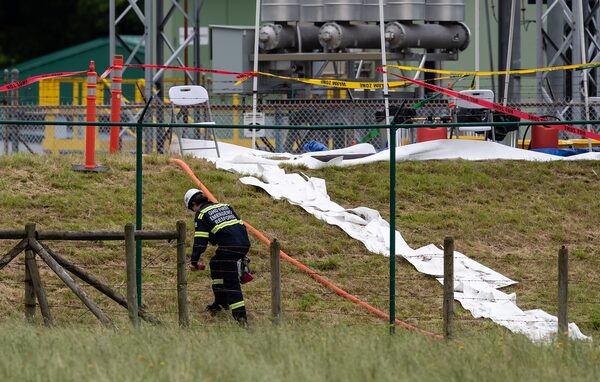
The pipeline company said the pipeline at the Sumas pump station in Abbotsford, B.C. – an emergency response worker seen here on June 14, 2020 – had been shut down and crews were investigating.DARRYL DYCK/The Canadian Press
Trans Mountain says a weekend oil spill in B.C. was caused by a pipeline fitting and that its air and water monitoring have not identified any risk to the public, but critics say the incident highlights what they consider unacceptable hazards of the pipeline’s proposed expansion.
The pipeline company on Saturday reported the spill, at the Sumas pump station in Abbotsford, B.C., saying the pipeline had been shut down and crews were investigating. By Sunday afternoon, the pipeline had been restarted. The company said it estimates that between 150 and 190 cubic metres, or between 940 and 1,195 barrels, of light crude oil was released, with all of that contained on Trans Mountain property.
Trans Mountain linked the cause of the spill to a fitting on a 2.5-centimetre pipe, and says the oil was contained, recovered and slated for disposal.
In an e-mail Monday, Trans Mountain said it would be checking other similar fittings at the pump station for any problems.
Investigations into the spill are now under way by the Transportation Safety Board and the Canada Energy Regulator. The B.C. government said it was monitoring the situation.
The existing pipeline carries about 300,000 barrels a day between Alberta and a marine terminal in Burnaby, B.C. A proposed expansion, now being built, would nearly triple that capacity. The federal government bought the project in May, 2018, after its U.S. owner tired of regulatory delays in developing the project.
Trans Mountain in a statement Sunday said its groundwater and air-quality monitoring had not identified “any risk to the public or community.”
Indigenous leaders said the accident reinforces their concerns about the expansion project.
“We conducted our own assessment of Trans Mountain using leading science and Tsleil-Waututh’s Indigenous law that concluded that oil spills are inevitable, can’t be fully cleaned up, and have devastating effects,” Tsleil-Waututh Nation chief Leah George-Wilson said Sunday in a statement.
Tsleil-Waututh Nation, based in B.C., opposes the pipeline based on concerns including the impact of increased ship traffic on endangered killer whales.
“It just brings a little bit more concern to the issues that Coldwater [Indian Band] has with this pipeline,” Coldwater Indian Band chief Lee Spahan said Monday in an interview.
“Even with 190,000 litres, to me it sounds significant,” he said.
The Coldwater Indian Band, based in south central B.C., has fought the proposed Trans Mountain expansion based on concerns it could harm a watershed that provides drinking water for band members.
The B.C. government, which opposes the project, said it is monitoring the cleanup efforts.
“B.C. will insist the federal regulator ensures Trans Mountain takes full responsibility for negative environmental or other impacts,” Environment Minister George Heyman said.
Ottawa initially approved the Trans Mountain expansion in 2016. In August, 2018, the Federal Court of Appeal quashed that approval, citing insufficient consultation with Indigenous groups and a flawed approval process that didn’t weigh the potential impact of increased shipping traffic on endangered killer whales.
After another round of consultations, the federal government reapproved the project in June, 2019.
That triggered another round of legal challenges, some of which were dismissed. In February, 2020, the Federal Court of Appeal ruled the second round of consultations had addressed shortcomings from the first round.
Four Indigenous groups – Tsleil-Waututh Nation, Squamish Nation, Ts’elxwéyeqw Tribes and the Coldwater Indian Band – in April said they are seeking leave to appeal that decision to the Supreme Court of Canada.
With files from Andrea Woo in Vancouver
 Wendy Stueck
Wendy Stueck